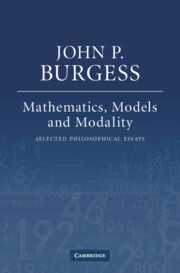Book contents
- Front matter
- Contents
- Preface
- Source notes
- Introduction
- PART I MATHEMATICS
- 1 Numbers and ideas
- 2 Why I am not a nominalist
- 3 Mathematics and Bleak House
- 4 Quine, analyticity, and philosophy of mathematics
- 5 Being explained away
- 6 E pluribus unum: plural logic and set theory
- 7 Logicism: a new look
- PART II MODELS, MODALITY, AND MORE
- Annotated bibliography
- References
- Index
4 - Quine, analyticity, and philosophy of mathematics
Published online by Cambridge University Press: 22 September 2009
- Front matter
- Contents
- Preface
- Source notes
- Introduction
- PART I MATHEMATICS
- 1 Numbers and ideas
- 2 Why I am not a nominalist
- 3 Mathematics and Bleak House
- 4 Quine, analyticity, and philosophy of mathematics
- 5 Being explained away
- 6 E pluribus unum: plural logic and set theory
- 7 Logicism: a new look
- PART II MODELS, MODALITY, AND MORE
- Annotated bibliography
- References
- Index
Summary
TWO SENSES OF “FOUNDATIONS OF MATHEMATICS”
Does mathematics requires a foundation? The first thing that must be said about the question is that the expression “foundations of mathematics” is ambiguous. Let me explain.
Modern mathematicians inherited from antiquity an ideal of rigor, according to which each mathematical theorem should be deduced from previously admitted results, and ultimately from an explicit list of postulates. It also inherited a further ideal according to which the postulates should be self-evidently true. During the great creative period of early modern mathematics, there were and probably had to be many departures from both ideals. But during the century before last, as mathematicians were driven or drawn to consider less familiar mathematical structures, from hyperbolic spaces to hypercomplex numbers, the need for rigor was increasingly felt, and higher standards were eventually instituted. But while the ideal of rigor may be claimed to have been realized, the ideal of selfevidence was not.
Considering only the ideal of rigor, the working mathematician's understanding of its requirements, of what is permissible in the way of modes of definition and modes of deduction of new mathematical notions and results from old, is largely implicit. Logic, which investigates such matters, and fixes explicit canons, is a subject in which the algebraist, analyst, or geometer need never take a formal course. Nor are mathematicians in practice much concerned with tracing back the chain of definitions and deductions beyond the recent literature in their fields to the ultimate primitives and postulates.
- Type
- Chapter
- Information
- Mathematics, Models, and ModalitySelected Philosophical Essays, pp. 66 - 84Publisher: Cambridge University PressPrint publication year: 2008



